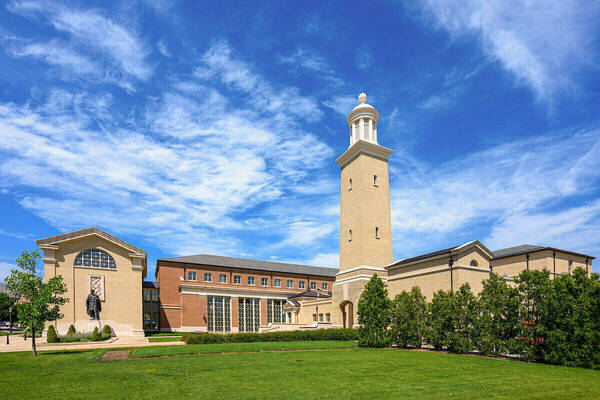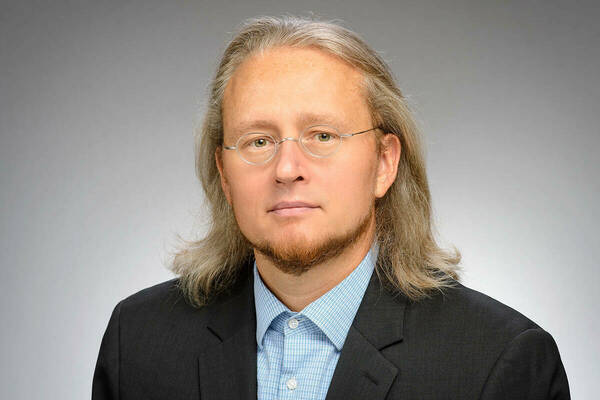Liam O’Connor selected as 2025 Richard H. Driehaus Prize Laureate at the University of Notre Dame; Philippe Rotthier wins Henry Hope Reed Award

Architect Liam O’Connor has been selected as the 2025 laureate of the Richard H. Driehaus Prize at the University of Notre Dame. The jury acknowledged his lifelong dedication to the design of a body of excellent new traditional public and private buildings and civic monuments — works projecting grace and beauty and expressing the shared emotions and cultural expectations of their audiences.
O’Connor’s war memorials, in particular, set his work apart for this year’s jury. The memorials are skillfully integrated into their urban or rural settings, with their landscape, fine art and construction details uniquely and thoughtfully developed in each case. Poetically charged, rationally disposed and emotionally laden, they are precisely sited, composed and constructed as statements of public admiration for the idea that freedom exists at all because of heroism and personal sacrifice for the common good, according to the jury citation.
The highest such integration of design, construction and symbolism is exemplified in his classical British Normandy Memorial that overlooks Gold Beach. The project is located adjacent to one of the five D-Day landing beaches during World War II. The memorial was inaugurated on June 6, 2021, 77 years after the 1944 landings, and commemorates the 22,442 British service personnel who sacrificed their lives there in the struggle to liberate Europe. The names of the fallen are carved into the structure’s 160 limestone Doric columns.

The Driehaus Prize citation states, “For this project, O’Connor orchestrated a masterplan for 60 acres of land and designed several structures to be eventually built from 3,500 tons of Burgundy limestone and hundreds of sustainably felled oak trees. Such was his commitment to this work that after its construction was halted during the coronavirus pandemic, he took on the task himself while directing 500 craftsmen and craftswomen.”
The citation continues, “Typical of O’Connor’s architecture is its enrichment by symbolic elements that add highly contemporary and personal dimensions to his interpretation of classicism. For the RAF Bomber Command Memorial in Hyde Park Corner in London, his reuse of riveted metal from downed aircraft to construct the central Doric pavilion’s roof memorializes the modern war machines central to these heroic aviators’ glory and demise.”
In addition, the citation noted “the merit of his private and commercial projects, where new construction blends into existing urban settings, in elegant and inventive designs that offer users and onlookers the gift of beautiful everyday places to be.”
Philippe Rotthier wins this year’s Henry Hope Reed Award
In conjunction with the Driehaus Prize, Philippe Rotthier was named the 2025 Henry Hope Reed Award laureate for his lifelong initiatives and continuing commitment to the cause of a new traditional architecture and urbanism. For more than 50 years he has dedicated his time and personal resources to resist the modernist disruption that followed WWII and lay the groundwork for reestablishing a culture of architectural continuity. Among his notable accomplishments was his renewal of vernacular architecture on the Island of Ibiza, Spain, where he built 80 houses using local materials and crafts.
The Philippe Rotthier Foundation, based in Brussels, Belgium, has provided the institutional framework for supporting this movement for architectural renewal through publications, exhibitions, occasional design competitions and his eponymous triennial architectural awards. His relentless advocacy for architectural change has enabled the emergence of two generations of significant young architects capable of exploring alternative forms of architectural modernity, including the 2025 Driehaus Prize laureate, Liam O’Connor.
Rotthier created the European Prize for the Reconstruction of the City that has been a catalyst for spreading the message of the intellectual, social and environmental merits of a contemporary classical and vernacular culture across the European continent. Since 1982, 86 award-winning works from 33 different countries have been awarded a Rotthier Prize.
Rotthier has been a significant contributor to the movement to rebuild existing and new communities and to steward nature in ways that have been proven to help humans flourish over thousands of years. The encouragement that he has provided to architects has begun to transform the practice of a new traditional architecture and urbanism worldwide at all scales, from repair through local design and craft, to new classical and vernacular architecture at the multi-block scale, to the urbanism of large-scale infill or city extension projects.
This year’s Driehaus Prize and Henry Hope Reed Award laureates were selected by a jury composed of Melissa DelVecchio, partner at Robert A.M. Stern Architects; Michael Lykoudis, professor of architecture at the University of Notre Dame; Léon Krier, architect and urbanist; Elizabeth Plater-Zyberk, founding principal of DPZ CoDesign and professor at the University of Miami; Demetri Porphyrios, principal of Porphyrios Associates, London; and Julia Treese, partner at Treese Architekten in Berlin and Munich. Stefanos Polyzoides, Notre Dame architecture professor and dean, and partner at Moule & Polyzoides, Architects and Urbanists, Pasadena, California, served as jury chair.
The $200,000 Driehaus Prize, the largest cash award in architecture worldwide, is granted by the Driehaus Trust in the name of Richard H. Driehaus, founder and chairman of Chicago-based Driehaus Capital Management LLC, as is the Henry Hope Reed Award of $50,000.
Contact: Carrie Gates, associate director of media relations, 574-993-9220, c.gates@nd.edu.
Latest ND NewsWire
- Notre Dame School of Architecture poised for global leadership through historic investmentThe $150 million gift represents an unprecedented commitment in the 160-year history of American architectural education. In recognition of this landmark gift, the school will be renamed the Matthew and Joyce Walsh School of Architecture at Notre Dame.
- Banks that identify fraudsters increase loyalty, retain more defrauded customers than others who never were compromisedIn a new research study, Vamsi Kanuri, the Viola D. Hank Associate Professor of Marketing at the University of Notre Dame’s Mendoza College of Business, found that banks that identify fraudsters earn customer loyalty and lose customers if they can’t say who was responsible for a fraudulent transaction.
- Notre Dame to host summit on AI, faith and human flourishing, introducing new DELTA frameworkThe Institute for Ethics and the Common Good and the Notre Dame Ethics Initiative will host the Notre Dame Summit on AI, Faith and Human Flourishing on the University’s campus from Monday, Sept. 22 through Thursday, Sept. 25. This event will draw together a dynamic, ecumenical group of educators, faith leaders, technologists, journalists, policymakers and young people who believe in the enduring relevance of Christian ethical thought in a world of powerful AI.
- Notre Dame Democracy Initiative hosts bipartisan conversation with Western state governorsTwo Western state governors known to work across the aisle on policy issues such as water, housing and energy will visit the University of Notre Dame for a fireside chat about how Western state pragmatism can serve as a model for the country to overcome polarization.
- In new research, Roy Scranton explores climate change and the limits of human progressIn his most recent book, “Impasse: Climate Change and the Limits of Progress,” Scranton, an associate professor of English, defines the impasse he sees as “not only political and institutional, but cognitive, existential and narrative” and asserts that the only path forward is through embracing what he terms ethical pessimism. “A lot of people confuse pessimism with nihilism, apathy and despair,” Scranton said. “But pessimism is actually about recognizing our limits, letting go of unrealistic goals, finding solidarity in the fact of human suffering and doing what you can now, not in some utopian future.
- Notre Dame MBA launches deferred admission programThe Notre Dame MBA Deferred Admission Program allows candidates with little or no work experience, including college seniors, to secure admission before reaching the recommended three years of work experience to enroll.













